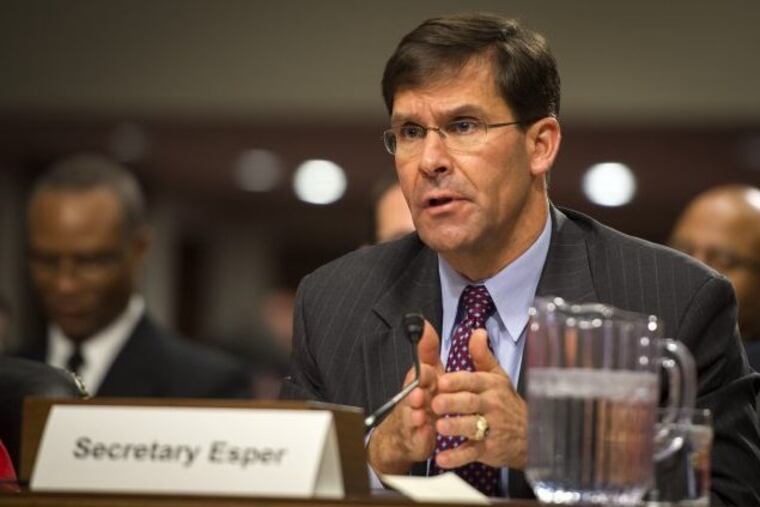Will U.S. Army Futures Command HQ and its 500 jobs come to Philly? Decision expected Friday
The Army previously eliminated Chicago, Dallas, Denver, and San Francisco.

The Pentagon is expected to make its final choice on Friday between Philadelphia and four other cities as the site for the headquarters of the U.S. military's new Army Futures Command, with hundreds of staff to speed up development times for new military systems from five years to one year.
The city is competing with Austin, Texas; Boston; Minneapolis; and Raleigh, N.C., said Army spokesperson Lt. Col. Monica Womack. The Army previously eliminated Chicago, Dallas, Denver, San Francisco, and other cities from an earlier list of 15 possible locations.
A source who works with the House Armed Services Committee said late Thursday that rumors circulating in the capital suggested the Army has chosen Austin, home to a robust software, tech investment, and university community. Army officials had no comment.
The facility is expected to employ around 500 initially, said Jacklin Rhoads, spokesperson for U.S. Sen. Robert P. Casey (D., Pa.). It could also attract contractors and representatives who sell arms, software, and other systems to the military.
Casey is one of a bipartisan group of six U.S. senators from Pennsylvania, New Jersey, and Delaware, and eight members of Congress representing the tri-state area who wrote to Army Under Secretary Ryan D. McCarthy earlier this year, touting the region.
McCarthy visited Philadelphia and other cities earlier this year to look at sites. "There was a team on the ground in Philadelphia," said Lauren Cox, spokesperson for the city commerce department. She said the headquarters would include around 100 military personnel and 400 civilians.
McCarthy said in a public meeting that Army leaders want to put the command in a city, not a rural Army base, so it has access to university-level skills and engineering as it develops new weapons and systems to cope with the rapid wasting of Army material in Afghanistan and other countries where U.S. troops are fighting.
The Army has shown interest in locations at the expanding University City Science Center, a consortium of Penn, Drexel, and other institutions that controls offices, labs, stores, apartments, and other amenities on 11 blocks of West Philadelphia adjoining the universities.
The center would not confirm prospective tenants. But there is "plenty of space," for example, at the center's latest building, 3675 Market St., which is scheduled to open later this year, center spokesperson Jeanne Mell said.
The headquarters would be a welcome boost for the city tech community, said Matthew P. Cabrey, head of the business-location group Select Greater Philadelphia First.
The Congressional members touted the region's skilled and technical workforce and its defense industry — which includes the Boeing factory that makes the Army's Chinook helicopters, plus electronics and software companies. The region is also home to the Navy engineering center in South Philadelphia, among other facilities, plus engineering schools, "high quality of life," and proximity to Washington and its nearby military facilities, they wrote.
The command will include eight "cross-functional teams" (CFTs), combining Army development, procurement standards, contracting, and "sustainment" staff to simplify what the Army calls its "requirements development process," Secretary of the Army Dr. Mark T. Esper said in a Senate Armed Services Committee hearing in December.
The teams will focus on the Army's "modernization priorities," which include better long-range "precision fire," a new combat vehicle, and missile defense, among other goals, Esper said at the time, adding that the service has learned from past procurement "failures."
The Army wants to move faster from prototypes, to testing, to evaluation and, if necessary, modify and repeat the whole process. That's so the people who start work on a weapon or system are more likely to still be there when it's ready to go into production.